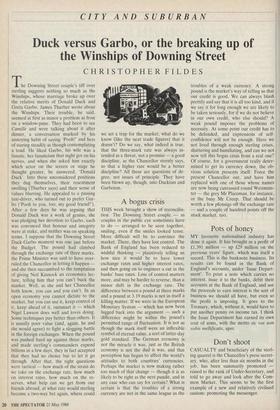A bogus crisis
THIS week brought a show of reconcilia- tion. The Downing Street couple — as couples in the public eye sometimes have to do — arranged to be seen together, smiling, even if the smiles looked tense. More difficult will be to convince the market. There, they have lost control. The Bank of England has been reduced to wishful thinking — plaintively telling us how nice it would be to have lower exchange rates and higher interest rates, and then going on to engineer a cut in the banks' base rates. Loss of control matters more, and may be harder to reverse, than a minor shift in the exchange rate. The difference between a pound at three marks and a pound at 3.19 marks is not in itself a killing matter. If we were in the European Monetary System — which has now been lugged back into the argument — such a difference might be within the pound's permitted range of fluctuation. It is not as though the mark itself were an inflexible symbol of eternal value, a sort of latter-day gold standard. The German economy is not the miracle it was, just as the British economy is not the dud it was, and that perception has begun to affect the world's attitudes to both countries' currencies. Perhaps the market is now making rather too much of that change — though it is as likely to be right as the next pundit, and in any case who can say for, certain? What is certain is that the troubles of a strong currency are not in the same league as the troubles of a weak currency. A strong pound is the market's way of telling us that our credit is good. We can always blush prettily and say that it is all too kind, and if we say it for long enough we are likely to be taken seriously, for if we do not believe in our own credit, who else should? A weak pound imposes the problems of necessity. At some point our credit has to be defended, and expressions of self- confidence will not be enough. Have we not lived through enough sterling crises, shattering and humiliating, and can we not now tell this bogus crisis from a real one? Of course, for a government really deter- mined to get its currency down, the ob- vious solution presents itself. Force the present Chancellor out, and have him replaced with one of those whose names are now being canvassed round Westmins- ter — the grey Mr Placeman, for instance, or the busy Mr Creep. That should be worth a few pfennigs off the exchange rate — and a couple of hundred points off the stock market, too.






























































 Previous page
Previous page